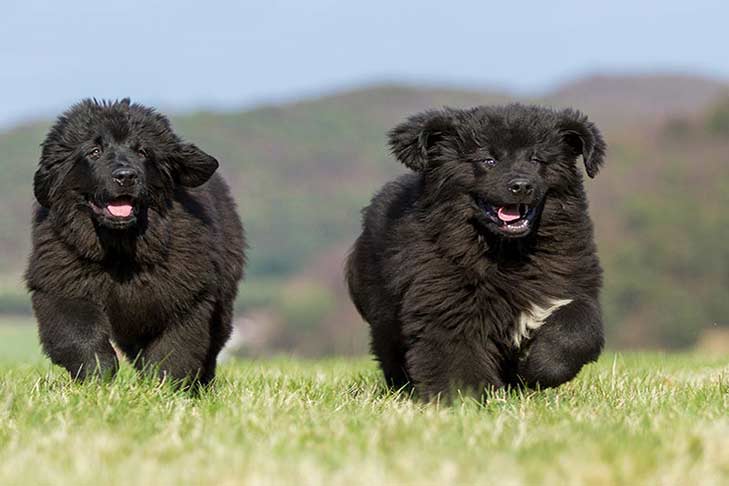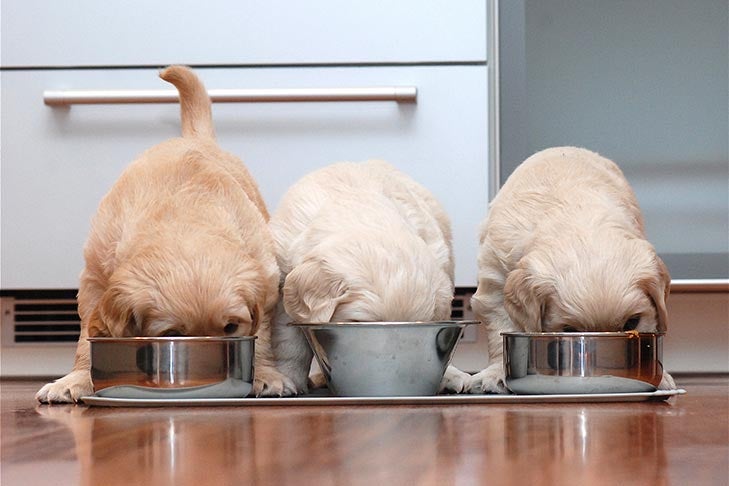- Feed your puppy a complete and balanced dog food to ensure healthy weight gain.
- Excess weight gain can be caused by switching to adult dog food too early.
- If you have a hard time feeling your puppy's ribs, they may be overweight.

You’ve welcomed a new puppy into your home. Congratulations! Now what? In addition to enjoying snuggles, playtime and the challenges and rewards of puppy training, it’s up to you to make sure your dog gets the right amount of food and exercise. Keeping healthy weight gain on track helps ensure a smooth transition from puppyhood to full-grown dogs.
To help you through this process, we’ve turned to Dr. Jerry Klein, Chief Veterinary Officer of the American Kennel Club, Dr. Lisa M. Freeman, veterinary nutritionist and professor of nutrition at the Cummings School of Veterinary Medicine at Tufts University, and Dr. Sean J. Delaney, veterinary nutritionist and founder of Balance IT Nutrition.
Healthy Diet & Exercise For Puppies
Before you introduce your puppy to your home, discuss the proper diet for your pet with the breeder (if applicable) and your veterinarian at your puppy’s first vet visit. Keep in mind that changing your puppy’s food in the first few days could lead to added stress and may cause digestive issues, according to Dr. Klein.
At this first appointment, the vet should help walk you through the basics of healthy feeding and exercise for puppies, including the following:
1. Feeding Puppies Dog Food Formulated By a Veterinary Nutritionist
Make sure the label says “complete and balanced diet” per Association of American Feed Control Officials (AAFCO) certification. That means the food meets the minimum nutritional requirements needed for puppies. Generally, major well-known dog food brands should meet these criteria.
2. Understanding How Nutritional Needs Vary By Age and Breed Size
Puppy nutrition needs differ from adult dog needs. Large and giant breeds also have different requirements than small-breed dogs. If you have a giant-breed puppy, you should find a food formulated for giant-breed puppies.
3. Not Overdoing It With Food
“There is no need to supplement a diet that is already labeled as complete and balanced,” says Dr. Klein.
Puppy owners should read and follow the food label’s feeding instructions based on their individual pet’s age and weight. Be sure to feed smaller servings more frequently, rather than too much all at once. Depending on your pet’s breed and size, you should feed your puppy three meals per day from two to six months of age.

After that, you can transition to two times per day. Giant breed dogs, meanwhile, can be fed three times per day until about six to eight months. It’s a good idea to remove food bowls 30 minutes after placing them down and make sure water is always available.
4. Never Overexercising Puppies
As a general rule of thumb, puppies should receive 10 minutes of exercise per day for every month of their age. For instance, 10 minutes at one month, 20 minutes at two months, and so forth. This amount of time can be spread throughout the day.
Puppies should not be jogging or doing road work before their joints become fully fused. This often occurs between 12–16 months of age for many breeds, though, for giant breeds, it may not happen until 18–20 months. Otherwise, this type of exercise may lead to stress and health issues with joints and bones, says Dr. Klein.
Recognize Signs of Healthy Weight Gain
So what are some physical signs your puppy’s weight gain is on track? According to Dr. Delaney, your pet’s ribs should be easily felt and you should see a noticeable waistline when looking from the side and from above. In other words, if you have a hard time feeling your puppy’s ribs or observe a rounded belly, these are signs of overfeeding and that your puppy may be overweight.
These are general guidelines that vary across breeds. An Azawakh, points out Dr. Klein, is built much differently than a St. Bernard. For best guidance, your veterinarian will be able to help accurately assess your puppy’s weight. Some of the most common mistakes Dr. Freeman sees when it comes to humans contributing to unhealthy puppy weight gain include:
Switching To Adult Food Too Early
“This is the biggest mistake I see,” says Dr. Freeman. “Growing small- and medium-breed puppies should be fed a puppy or all-life stages formula made by a well-established manufacturer until 12 months of age. Large- and giant-breed puppies should be fed a diet specifically designed for large-breed puppies until 12–18 months of age.”
Not Knowing How Spaying or Neutering Reduces Calorie Requirements
Once puppies have these procedures done, they don’t need to eat as much. So you should plan on reducing your puppy’s daily calorie intake. Doing so helps to keep your dog lean. However, still keep them on puppy food if they’re less than one year of age, according to Dr. Freeman.
Letting Puppies Get Overweight or Grow Too Quickly
“For optimal health of puppies — and to help them live a long, healthy life — it is critical to keep puppies lean throughout their growth period,” says Dr. Freeman, who recommends assessing your puppy’s weight frequently.
Overfeeding Your Puppy
According to these veterinary experts, overfeeding can lead to a life of health problems, with overweight puppies being more likely to become overweight or obese adult dogs. Overfeeding can also contribute to joint and orthopedic issues, and ultimately lead to a shorter lifespan.

Know When To Visit The Vet
If your puppy isn’t eating well, you should contact a veterinarian, says Dr. Klein. Otherwise, during this period of rapid growth, you should plan on taking your puppy to see the vet every three to four weeks, he adds.
Routine visits early on can help prevent extra weight gain, as your vet can help you make adjustments to your puppy’s feeding and prevent longer-term impacts of being overweight or obese, says Dr. Delaney.


